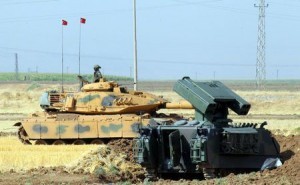Turkey escalated its opposition to a Kurdish independence referendum in northern Iraq on Tuesday, training tank guns and rocket launchers across the southern border and saying the break-up of its neighbors could lead to global conflict.
Defense Minister Nurettin Canikli said in Ankara next Monday’s vote posed a major risk and Turkey would take “every step” needed to thwart any similar steps in its mainly Kurdish southeast.
Iraqi Kurdish authorities have defied growing international pressure to call off the vote, which Iraq’s neighbors fear will fuel unrest among their own Kurdish populations. Western allies say it could detract from the fight against Islamic State.
“A change that will mean the violation of Iraq’s territorial integrity poses a major risk for Turkey,” Canikli said. “The disruption of Syria and Iraq’s territorial integrity will ignite a bigger, global conflict with an unseen end.”
Kurds in north Syria, like those in Iraq, have capitalized on the turmoil in both countries to consolidate a degree of autonomy. Washington has supported Syrian Kurdish fighters battling Islamic State, despite Turkish protests.
Turkish troops dug in on the southern border on Tuesday and turned their weapons toward Kurdish-run northern Iraq.
Tanks and rocket launchers mounted on armored vehicles faced the Iraqi frontier, about 2 km (one mile) away. Mechanical diggers tore up agricultural fields for the army to set up positions in the flat, dry farmlands.
The military drill, launched without warning on Monday, is due to last until Sept. 26, Turkish military sources said, a day after the planned referendum.
A Reuters reporter saw armored vehicles carrying heavy weaponry and soldiers taking positions in specially dug areas, their weapons directed across the border. A generator and satellite dish could be seen at one location.
The show of force reflects the scale of concern in Turkey, which has the largest Kurdish population in the region, that the vote could embolden the outlawed Kurdish PKK which has waged a three-decade insurgency in Turkey’s southeast since 1984.
The Turkish air force has frequently struck against PKK units operating from the mountains of northern Iraq and limited detachments of Turkish infantry have made forays across the frontier in the past.
Turkey also sees itself as protector of Iraq’s ethnic Turkmen minority, with particular concern about Kirkuk where Kurds have extended their control since seizing the oil city when Islamic State overwhelmed Iraqi forces in 2014.
Police deployed overnight in Kirkuk to prevent any outbreak of ethnic violence, residents said.
LIRA WEAKENS
The standoff has hit the Turkish lira, which weakened beyond 3.5 to the dollar on Tuesday for the first time in four weeks.
“The increasing tension before the referendum in northern Iraq continues to effect lira negatively,” Kapital FX Research Assistant Manager Enver Erkan said.
Cross-border trade, however, appeared to continue. Despite the nearby military maneuvers a kilometer-long line of traffic, mostly trucks and cargo, queued to enter Iraq at the Habour border gate.
Turkey’s strong economic ties to the Kurdish Regional Government (KRG) will weigh on any response from Ankara. The KRG pumps hundreds of thousands of barrels of oil per day through Turkey and has approved plans for Russian oil major Rosneft to invest in pipelines to export gas to Turkey and Europe.
The military exercises came as Turkey, the central government in Baghdad and their shared neighbor Iran all stepped up protests and warnings about the independence referendum in the semi-autonomous Kurdish northern Iraq.
The United States and other Western countries have also voiced concerns and asked Iraqi Kurdish leader Massoud Barzani to call off the vote, citing fears the referendum could distract attention from the fight against Islamic State militants.
Iraq’s Supreme Federal Court ordered Barzani to suspend the vote and approved Iraqi Prime Minister Haider al-Abadi’s demand to consider “the breakaway of any region or province from Iraq as unconstitutional”, his office said on Monday.
Turkey has brought forward to Friday a cabinet meeting and a session of its national security council to consider possible action.
Ask me anything
Explore related questions





